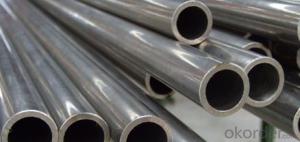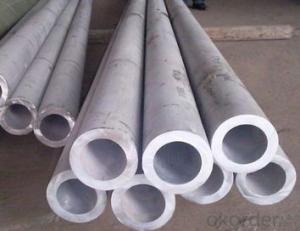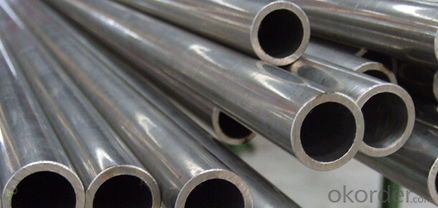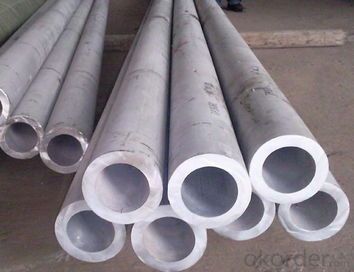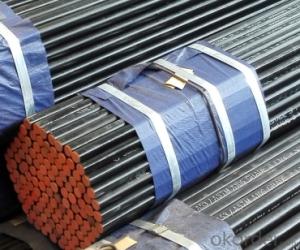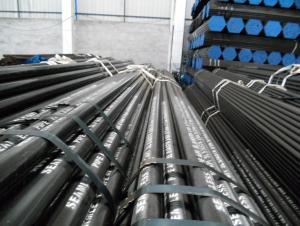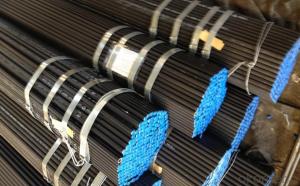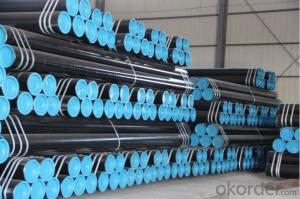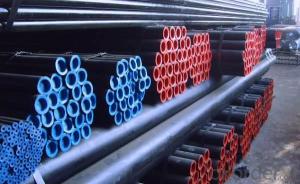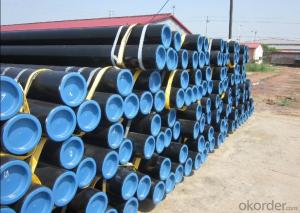API 5L ASTM A53/ASTM A106 PSL 1 Seamless Carbon Steel Pipe For Sturcture
- Loading Port:
- Tianjin
- Payment Terms:
- TT OR LC
- Min Order Qty:
- 25 m.t.
- Supply Capability:
- 10000 m.t./month
OKorder Service Pledge
OKorder Financial Service
You Might Also Like
Product Description:
1、Structure of API 5L ASTM A53/ASTM A106 PSL 1 Seamless Carbon Steel Pipe For Sturcture:
Seamless pipe is formed by drawing a solid billet over a piercing rod to create the hollow shell. As the manufacturing process does not include any welding, seamless pipes are perceived to be stronger and more reliable. Historically seamless pipe was regarded as withstanding pressure better than other types, and was often more easily available than welded pipe.
2、Main Features of API 5L ASTM A53/ASTM A106 PSL 1 Seamless Carbon Steel Pipe For Sturcture:
• High manufacturing accuracy
• High strength
• Small inertia resistance
• Strong heat dissipation ability
• Good visual effect
• Reasonable price
3、API 5L ASTM A53/ASTM A106 PSL 1 Seamless Carbon Steel Pipe For Sturcture Images:
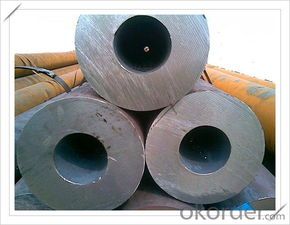
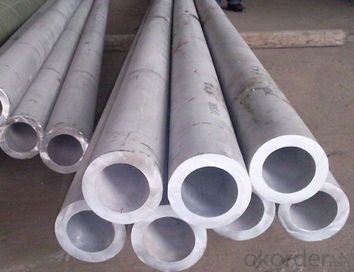
Packaging & Delivery
Packaging Details: | seaworthy package,bundles wrapped with strong steel strip |
Delivery Detail: | 15-30days after received 30%TT |
4、API 5L ASTM A53/ASTM A106 PSL 1 Seamless Carbon Steel Pipe For Sturcture Specification:
Standard | GB, DIN, ASTM |
Grade | 10#-45#, 16Mn |
Thickness | 8 - 33 mm |
Section Shape | Round |
Outer Diameter | 133 - 219 mm |
Place of Origin | Shandong, China (Mainland) |
Secondary Or Not | Non-secondary |
Application | Hydraulic Pipe |
Technique | Cold Drawn |
Certification | API |
Surface Treatment | factory state or painted black |
Special Pipe | API Pipe |
Alloy Or Not | Non-alloy |
Length | 5-12M |
Outer Diameter | 21.3-610mm |
Grade | 20#, 45#, Q345, API J55, API K55, API L80, API N80, API P110, A53B |
Standard | ASME, ASTM |
1.Material:20#(ASTM A 106/A53 GRB.API5LGRB,GB),45#,16Mn,10#.
2.Specification range:OD:21.3-610mm,WT:6-70mm,length:6-12m or according to the requirement of clients.
3.Excutive standards:GB,ASME API5L.ASTM A 106/A53,Despite of the above standards,we can also supply seamless steel pipe with standard of DIN,JIS,and so on,and also develop new products according to the requirements of our clients!
4.Surface:black lacquered,varnish coating or galvanized.
5.Ends:Beveled or square cut,plastic capped,painted.
6.Packing:bundles wrapped with strong steel strip,seaworthy packing.
5、FAQ of API 5L ASTM A53/ASTM A106 PSL 1 Seamless Carbon Steel Pipe For Sturcture:
①How is the quality of your products?
Our products are manufactured strictly according to national and internaional standard, and we take a test
on every pipe before delivered out. If you want see our quality certifications and all kinds of testing report, please just ask us for it.
Guaranteed: If products’ quality don’t accord to discription as we give or the promise before you place order, we promise 100% refund.
②How about price?
Yes, we are factory and be able to give you lowest price below market one, and we have a policy that “ for saving time and absolutely honest business attitude, we quote as lowest as possible for any customer, and discount can be given according to quantity”,if you like bargain and factory price is not low enough as you think, just don’t waste your time.Please trust the quotation we would give you, it is professional one.
③Why should you chose us?
Chose happens because of quality, then price, We can give you both.Additionally, we can also offer professional products inquiry, products knowledge train(for agents), smooth goods delivery, exellent customer solution proposals.Our service formula: good quality+good price+good service=customer’s trust
SGS test is available, customer inspection before shipping is welcome, third party inspection is no problem.
Any question, pls feel free to contact us !
- Q: Can steel pipes be recycled?
- Yes, steel pipes can be recycled. Steel is a highly recyclable material and can be used to create new steel products, including pipes, through processes like melting and reshaping. This helps to conserve natural resources, reduce energy consumption, and minimize waste.
- Q: How do you calculate the pipe flow velocity coefficient for steel pipes?
- The pipe flow velocity coefficient for steel pipes can be calculated using the Darcy-Weisbach equation, which takes into account factors such as pipe diameter, roughness, and flow rate. This equation incorporates the friction factor, which is commonly determined through empirical correlations or by using Moody's diagram.
- Q: How are steel pipes used in the manufacturing of heat exchangers?
- Steel pipes are commonly used in the manufacturing of heat exchangers due to their excellent heat transfer properties and durability. They are utilized as the main components for carrying and transferring hot or cold fluids within the heat exchanger system. The steel pipes ensure efficient heat exchange by providing a smooth and continuous flow of the fluid, while also withstanding high temperatures and pressures. Additionally, steel pipes are often preferred for their corrosion resistance, making them suitable for various industrial applications requiring reliable and long-lasting heat exchangers.
- Q: How are steel pipes transported and stored?
- Steel pipes are typically transported using trucks, trains, or ships, depending on the distance and quantity. These pipes are often stacked and secured with straps or chains during transportation to prevent any movement or damage. When it comes to storage, steel pipes are commonly stored in outdoor yards or warehouses. They are usually organized in neat rows or stacked on racks to maximize space and facilitate easy access. Additionally, pipes may be covered with weather-resistant materials to protect them from rust or corrosion during storage.
- Q: What are the factors that affect the pressure rating of steel pipes?
- The pressure rating of steel pipes can be influenced by various factors. These factors include the strength of the material used, the thickness of the pipe wall, the diameter of the pipe, the temperature at which it operates, its resistance to corrosion, compliance with manufacturing standards, and the impact of external loads. The strength of the steel plays a crucial role in determining the pressure rating. Steel with higher strength can handle higher pressure levels, while weaker grades may have lower ratings. Thicker walls provide more resistance against internal forces, allowing pipes to handle higher pressures. The diameter of the pipe also affects its pressure rating. Larger pipes generally have higher ratings due to their larger cross-sectional area. High temperatures can weaken steel, reducing its strength and pressure rating. Therefore, maximum operating temperature should be considered. Corrosion can weaken the pipe material over time, leading to a decrease in pressure rating. Factors such as fluid type, pH levels, and environmental conditions can impact corrosion resistance. Compliance with industry standards is crucial in determining pressure ratings. These standards ensure proper manufacturing techniques and materials are used. External loads such as soil settlement or traffic can affect pressure ratings. Proper design, installation, support, and protection are necessary to maintain the pressure rating. Considering all these factors and consulting industry guidelines is important for determining appropriate pressure ratings for steel pipes in different applications.
- Q: What are the different types of steel pipe tees?
- There are three main types of steel pipe tees: equal tee, reducing tee, and barred tee.
- Q: What is the role of steel pipes in the transportation of petroleum products?
- Steel pipes play a crucial role in the transportation of petroleum products. These pipes are specifically designed to withstand the high pressure and extreme temperatures associated with the transportation of oil and gas. One of the main roles of steel pipes in this process is to provide a reliable and secure conduit for the transportation of petroleum products over long distances. They are used to create pipelines that span hundreds or even thousands of miles, connecting oil fields, refineries, and distribution centers. Steel pipes are preferred for this purpose due to their strength, durability, and resistance to corrosion. The high tensile strength of steel allows these pipes to withstand the immense pressure exerted by the petroleum products as they flow through the pipelines. Additionally, steel pipes have the ability to withstand extreme temperatures, ensuring the safe transportation of hot crude oil or refined petroleum products. Furthermore, steel pipes are highly resistant to corrosion, which is a critical factor given the corrosive nature of petroleum products. The pipes are often coated with protective materials, such as epoxy or polyethylene, to further enhance their resistance to corrosion. This helps to prevent leaks or ruptures that could lead to environmental damage or safety hazards. Steel pipes also offer cost-effective and efficient transportation of petroleum products. They have a smooth interior surface, which reduces friction and allows for a more efficient flow of oil or gas. This, in turn, helps to minimize energy consumption and maximize the throughput of the pipeline system. In summary, the role of steel pipes in the transportation of petroleum products is to provide a reliable, secure, and efficient means of transporting oil and gas over long distances. They are designed to withstand high pressure, extreme temperatures, and corrosion, ensuring the safe and efficient delivery of petroleum products from production sites to refineries and distribution centers.
- Q: Can steel pipes be used for transporting chemicals?
- Yes, steel pipes can be used for transporting chemicals. Steel pipes are known for their high strength and durability, making them suitable for handling various chemicals, including corrosive substances. Additionally, steel pipes can withstand high pressure and temperature conditions, ensuring the safe transportation of chemicals. However, it is essential to select the appropriate grade of steel and implement proper coating or lining to prevent chemical reactions or corrosion that may compromise the integrity of the pipes.
- Q: How are steel pipes classified based on their thickness?
- Steel pipes are classified based on their thickness into three categories: standard, extra strong, and double extra strong.
- Q: How are steel pipes used in the manufacturing of desalination plants?
- Steel pipes are used in the manufacturing of desalination plants for various purposes such as transporting seawater, brine, and treated water within the plant. They provide durability, corrosion resistance, and the necessary strength to withstand high-pressure conditions, ensuring the efficient operation and long-term reliability of the desalination process.
Send your message to us
API 5L ASTM A53/ASTM A106 PSL 1 Seamless Carbon Steel Pipe For Sturcture
- Loading Port:
- Tianjin
- Payment Terms:
- TT OR LC
- Min Order Qty:
- 25 m.t.
- Supply Capability:
- 10000 m.t./month
OKorder Service Pledge
OKorder Financial Service
Similar products
Hot products
Hot Searches
Related keywords
